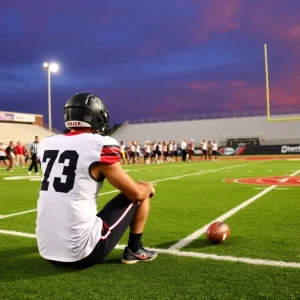Chapin Residents Divided Over Sign Carrying Permit Requirements
Chapin, South Carolina
On a rather calm morning in Chapin, with the sun slipping in and out from behind the clouds, the peaceful atmosphere was stirred up by a local man, Ernest Giardino. He has been walking the streets of this picturesque town, which has a population of just under 2,000, holding a sign that reads, “Trust Christ, He paid the price.” For eight months now, Ernest has made it a routine to proclaim his faith through his colorful sign. However, his journey took an unexpected turn when a police officer told him he needed a permit to continue his mission.
On June 20, 2024, while Ernest was peacefully marching along the corner of Old Lexington Highway and Chapin Road, he was approached by a police officer who informed him that carrying his sign was not permissible without a demonstration permit. This caught him off guard, as his only goal was to share his message. According to his attorneys, the town of Chapin confirmed the officer’s statement, requiring Giardino to apply for a permit in order to carry his sign publicly.
The Town’s Regulations
In a response to the situation, the town of Chapin’s spokesperson, Nicholle Burroughs, indicated that they have required demonstration permits since 1980. The town insists that this rule helps maintain order and prevents disturbances in daily life. “Our goal is to balance the right to free speech with reasonable regulations,” Burroughs explained. Since the police encounter in June, Chapin has issued over 17 public demonstration permits. The town has a process in place that mandates demonstrators to submit their permit applications at least 14 days in advance.
While these rules might appear to be a protective measure, it raises a significant question—are they infringing upon people’s rights to express themselves freely? Giardino’s attorney, Nathan Kellum, is adamant that the regulations should not apply to someone merely carrying a sign sharing a message of faith. He argues that constitutional rights should be upheld on public property, and that Ernest’s simple act of sharing his beliefs should not require a permit.
The Legal Battle
The ongoing conflict has put Chapin’s regulations under scrutiny. Kellum stated in an interview that it is important for the town to recognize the merits of Giardino’s case. “If it’s public property, then constitutional rights have to be recognized there,” he said, pushing back against the town’s stated reasoning behind the permit requirement.
In light of these events, Giardino and his legal team have drafted a letter to the town’s mayor, Al Koon, and Police Chief Thomas Griffin, demanding that Chapin allows him to continue to picket without applying for a permit. They are looking to provide the town with some time to respond to their request before considering any further legal action.
Community Reactions
As this debate unfolds, residents of Chapin find themselves divided on the issue. Some support the town’s efforts to regulate public demonstrations to maintain order, while others empathize with Giardino’s right to share his message without bureaucratic hurdles. Conversations in coffee shops and community bulletin boards around town showcase a range of opinions, with the rising question: “Shouldn’t everyone be free to express their beliefs in public spaces?”
The outcome of this case could set a precedent in Chapin and potentially impact future demonstrations. It’s not just about Giardino’s sign; it’s about freedom of expression and how communities navigate that delicate balance. As both sides prepare for what lies ahead, the small town of Chapin is becoming a focal point for discussions about civil liberties and community regulations.
It’s certainly an interesting time for Chapin as it navigates this situation. Whether you’re on Team Ernest or backing the town’s regulations, one thing is for certain—this little town is making waves in the broader conversation about free speech and community standards.




























